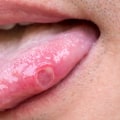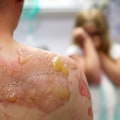Are you dealing with blisters on your tongue and gums? Unpleasant and painful, these sores can be a symptom of oral herpes, an infection caused by the herpes simplex virus (HSV). In this article, we'll take a look at what causes blisters on the tongue and gums, how to recognize them, and what you can do to treat them. Read on to learn more about this uncomfortable condition and how to manage it. If you are looking for a dating website for people with herpes, it is important to understand what might be causing the blisters in order to determine the best treatment and prevention methods. Common causes of blisters on the tongue and gums include cold sores, canker sores, or other infections.
Treatment for blisters on the tongue and gums depend on the underlying cause. Over-the-counter medications such as ibuprofen may help reduce pain and inflammation associated with blisters. Other remedies such as saltwater rinses or aloe vera gel can help soothe the affected area. In order to prevent blisters on the tongue and gums, it is important to practice good oral hygiene such as brushing twice a day and flossing daily.
Additionally, avoiding acidic foods may help prevent irritation and inflammation. If the blisters persist or are accompanied by other symptoms such as fever or swelling, it is important to seek medical attention. A doctor can examine the affected area and prescribe a course of treatment that is most appropriate for the underlying condition.
Treatments for Blisters on the Tongue and Gums
Treatments for Blisters on the Tongue and GumsBlisters on the tongue and gums can be painful and uncomfortable. Fortunately, there are a variety of treatments available to help reduce symptoms and speed up the healing process. Over-the-counter medications, such as ibuprofen or acetaminophen, may be used to reduce swelling and pain associated with blisters.These medications can be taken orally or applied topically. Additionally, topical anesthetics, such as lidocaine, may be used to provide temporary relief from the discomfort of blisters. If you are looking for more natural remedies, there are several home remedies that may help treat blisters on the tongue and gums. Applying a cold compress or ice pack to the affected area can help reduce inflammation and pain. Additionally, applying natural aloe vera gel to the affected area can provide relief from the burning sensation associated with blisters. For those looking for more long-term solutions, there are several dietary changes that may help reduce the occurrence of blisters.
Eating a balanced diet that is rich in vitamins and minerals can help keep your immune system strong, which can reduce the risk of blisters. Additionally, avoiding certain foods that can irritate the mouth, such as acidic foods or spicy foods, can help prevent the occurrence of blisters.
When to See a Doctor
If you have blisters on your tongue or gums that cause pain or discomfort, it is important to see a doctor. A doctor can diagnose the underlying cause of the blisters and provide appropriate treatment. In some cases, the blisters may be caused by a virus, such as herpes simplex virus (HSV).When the blisters are caused by HSV, a doctor may prescribe antiviral medications to help reduce the symptoms. Additionally, a doctor can provide tips for relieving discomfort and preventing further outbreaks. It is also important to see a doctor if the blisters persist for more than a week or if they are accompanied by other symptoms such as fever, headaches, muscle aches, or swollen lymph nodes. These may be signs of an infection that requires further treatment. Additionally, some medical conditions can cause blisters on the tongue and gums. It is important to speak to your doctor if you are experiencing any of these symptoms or have a history of medical conditions that could be related.
Your doctor can recommend the best course of treatment.
Causes of Blisters on the Tongue and Gums
Blisters on the tongue and gums can be caused by a variety of factors, including cold sores, canker sores, or other infections. Cold sores are caused by the herpes simplex virus (HSV), while canker sores are non-contagious and usually form due to stress or fatigue. Other infections that can cause blisters on the tongue and gums include thrush, hand-foot-mouth disease, and herpes zoster. Cold sores are small blisters that usually appear on the lips, but can also appear on the gums or tongue.They are usually filled with a clear fluid and can be painful. Canker sores are also small blisters, but they are white or yellow in color and are not contagious. Thrush is an infection caused by a fungus, usually Candida albicans. Symptoms of thrush include white patches on the tongue and gums, as well as burning and pain.
Hand-foot-mouth disease is caused by a virus and is more common in children. Symptoms include painful blisters in the mouth, as well as red spots on the hands and feet. Herpes zoster is an infection caused by the varicella-zoster virus, which is the same virus that causes chickenpox. Symptoms include painful blisters on the tongue and gums. It is important to see a doctor if you have any of these symptoms.
The doctor can diagnose the cause of the blisters and recommend treatments to help reduce pain and discomfort.
Prevention Tips for Blisters on the Tongue and Gums
Although blisters on the tongue and gums can be caused by a variety of conditions, there are some preventative measures you can take to reduce your risk of developing them. Here are some tips for preventing blisters on the tongue and gums:Avoid acidic foods: Acidic foods, such as citrus fruits, tomatoes, and vinegar, can irritate the delicate tissues of the mouth and increase your risk of developing blisters. Try to limit your intake of these foods as much as possible.Practice good oral hygiene:
Brushing and flossing regularly can help keep bacteria and plaque from building up in your mouth, reducing your risk of developing blisters.Be sure to brush your teeth twice a day and floss once a day to keep your mouth healthy.
Stay hydrated:
Staying hydrated is important for overall health, but it can also help prevent blisters on the tongue and gums. Drinking plenty of water throughout the day will help keep your mouth moist, which can help reduce irritation and inflammation.Use a soft toothbrush:
Using a soft-bristled toothbrush will help protect the delicate tissues of the mouth from damage and reduce your risk of developing blisters.See a dentist regularly: Seeing a dentist regularly for check-ups and cleanings can help detect any signs of oral health issues early, reducing your risk of developing blisters on the tongue and gums. In conclusion, blisters on the tongue and gums can be a painful and uncomfortable experience. It is important to understand the potential causes, as well as treatments and prevention tips that can help reduce the risk of developing blisters. If you experience any symptoms or have any questions about blisters on the tongue and gums, it is important to seek medical advice.


